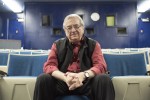Howard Suber leans on a desk, the last scenes of “Apocalypse Now” flickering in his oval glasses.
The film professor has seen the movie countless times over the years, and while the crashing symbols and dual slaughter scenes overwhelm most viewers, Suber’s eye is fixed as ever on a minute detail: the hero relinquishing his status by dropping his machete.
2015 marks Professor Suber’s 50th year teaching at UCLA. He has dedicated almost all his career to the study of film and the nurturing of young, curious minds in the discipline.
On Oct. 2, the James Bridges Theater was filled with Suber’s students from the past and present. Professor William McDonald, who is chair of the Department of Film, Televison and Digital Media and a former student of Suber’s, said everyone was there to pay tribute to him and the influence he has had on their lives.
McDonald described Suber’s contribution to the UCLA School of Theater, Film and Television as immense. He said Suber has chaired and helped establish the Critical Studies Program, the UCLA Film & Television Archive and the UCLA Producers Program. According to McDonald, Suber has taught over 63 unique courses at UCLA.
“There’s just something in Professor Suber’s DNA to just try to understand the core rules that are involved in how we communicate stories,” McDonald said.
Before he set foot in the brightly lit corridors of Melnitz Hall, Suber said he never imagined doing anything for such a long period of time, let alone teaching film. However, he said he soon discovered a love for teaching and now he lives for it.
“In my early years, people would ask me what I did for a living, and I would say I teach film at UCLA,” Suber said. “The usual response they gave me was ‘What, you teach film in a university? What’s there to teach? Why would a grown man do that?’ I don’t have to justify that anymore.”
In 1994, Suber left the halls of Melnitz for retirement. However, he has since given in to popular request and put his retirement on hold in favor of his “Film Structure” class, which he teaches as a professor emeritus.
Kevin Karch, a UCLA graduate student in screenwriting, said he has taken Suber’s class four years in a row because every lecture is insightful. He said the theme of despair and how to overcome it regularly comes up in the class.
“For (Suber), despair goes hand in hand with hope,” Karch said. “He offers hope through philosophical approaches, psychology and politics. He gets everything and brings it all together through the films.”
When taking one of Suber’s courses on “Citizen Kane” in 1968, Professor Stephen Mamber, now vice chair of the Cinema and Media Studies Program, recalls the class studied the film by watching it every week.
Each time, Suber would bring in a guest who had worked on different aspects of the film. By the 10th viewing, Mamber said not a single member of the class was bored, but all of them had gained a detailed understanding of the film.
“Every week he had fresh ideas to bring, and it made me realize that with great films you really do have to see them more than once,” Mamber said. “I don’t know of anybody since who’s dared to do a class like that.”
After this stage in his long career, Suber said he now looks back and concludes the most important thing he has taught his classes is that they’re not students of history – they’re part of history.
He said because film is such a rapidly changing medium, those who study it shouldn’t always get bogged down with what has come before.
“I’m contemplating the idea that the era that I’ve devoted most of my attention to for 50 years may be over,” Suber said. “I don’t say that sadly, I’m not going to walk off into the sunset and I won’t be caught dead saying they don’t make films like they used to.”
When he heard of a school on the West Coast with a graduate film program in the spring of 1959, Suber said he couldn’t believe his luck. He said he feels privileged to have spent so much of his life dealing with great works. Over half a century later, Professor Suber is still here, and the movies continue to flicker in his glasses.
“I feel 78 when I’m at home, which is my actual age. I feel 47 in the classroom,” Suber said. “It’s like so many things, when you’ve done them for a long, long time, they’re part of who you are.”
